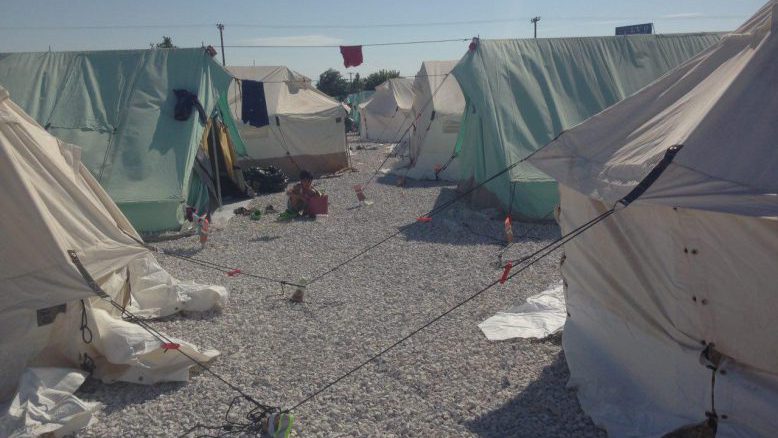Since the Greek government evicted the makeshift camp of Idomeni at the border to Macedonia, former inhabitants were brought to official camps run by the Greek military or the UNHCR. Moving Europe investigated the conditions in six of the newly erected camps around Thessaloniki. The reality at these sites contradicts the promises of better living conditions than Idomeni and improved access to legal procedures, made by the authorities and the UNHCR.
With the transfer to the new camps, refugees have been betrayed regarding these pledges of improvement. In all camps, residents complained about the lack of sanitary facilities. The number of toilets and showers is insufficient, often there are no showers at all and no hot water provided. “There are not enough toilets and showers, all are very dirty. They just build them after 3 days and no hot water,” one person in a camp in Kalochori complained. In almost all camps, food supply is inadequate and often barely existing. Residents in four camps reported that often only one croissant a day and a small juice per person were provided. In three camps, solidarity kitchens have started supplying hot food as people haven not eaten properly for days.
The health care situation in the camps is particularly unjustifiable. As Moving Europe witnessed and learned when discussing with refugees in the camps, none of the new camps provides sufficient medical service until now. The only possibility for urgent emergencies is to ask the military, the police or the UNHCR staff in the camp to call an ambulance. But even in these situations, individuals without medical expertise define the urgency of the case. In several instances, people were abandoned after being taken to a hospital, left without support for finding the way back to the camps which are located remotely, hard to find and hard to access by public transport. One man reported that he and his highly pregnant wife had to pay 50€ for the taxi to return to the camp. Another family with sick children could not go to the hospital at all, because they did not have any money left for the way back. The emergency station at the Papageorigiou hospital of Thessaloniki is overcrowded until late in the night, with mainly children in severe health conditions being left without sufficient care and attention. The dramatic health conditions of many children demonstrates that minors are especially in danger in the badly maintained camps.
Furthermore, camps are located far outside the city center in dilapidated industrial areas in the suburbs of Thessaloniki. Infrastructures, supermarkets and social life are remote and most of the camps are not connected with public transportation. Given these conditions, the chance for self-sustenance (including nutrition and medicine) is extremely limited. To overcome the distance and gain access is only possible for those who have some money left. But the resources available for most people in the camps are constantly diminishing, as daily expenses of the people stuck in Greece consume the resources calculated for the route. One father stated: “We have spent all of our savings the last month in Idomeni, we cannot afford a taxi back to the camp and there is no bus. Shall I walk with my pregnant wife and my children?.” The authorities which caused this situation are failing to cover basic requirements and support for those in need.
None of the camps we visited provides access to the legal programs such as the Relocation Program or Family Reunification, contrary to the promises made before the eviction of Idomeni. Due to the lack of Wi-Fi in most of the camps, families and individuals wanting to access official procedures cannot even try to call the Asylum Service through Skype by themselves (previously the only way to get an appointment). Reportedly, UNHCR visits most of the camps irregularly, and promises registration for these programs within the next weeks. However, the inhabitants of the camps we spoke to no longer believe these promises. As one father describes his life within the last three months: “We were promised every day something new, but nothing ever happened. Also Skype is not working.”
The European Union, the Greek authorities and the UNHCR are responsible for the current excruciating situation. The cut down of food supplies, water and electricity as well as denying some of the medical staff and supporters access to the camp in Idomeni weakened the inhabitants and eased the eviction for the authorities. The spreading of false information and false promises about the conditions in the new camps conduced many refugees to leave Idomeni. The big gap between the promises, the statements of the authorities on the situation and the reality people are living in cannot be ignored. The demands and desires of people who are continuously excluded and suffer the inhumane consequences of restrictive border policies remain unfulfilled. The dire conditions in the camps cannot be ignored any longer and need to change urgently. It is necessary that the needs of people are answered and that they can access their rights. Instead of being excluded, people should be assisted in finding dignity in the places they want to go to.
For more detailed information and pictures from the camps referred to, see the situational updates below:

